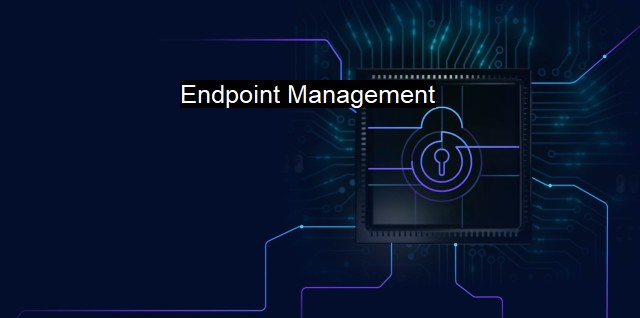What is Endpoint Management?
Enhancing Cybersecurity: The Essential Role of Endpoint Management in Safeguarding Organizational Networks & Endpoints in an Evolving Digital Landscape"
Endpoint management refers to the process by which an entity centrally manages all the endpoints or entry points on its network. These endpoints include laptops, desktops, mobile phones, and almost every IoT device connected to the network. Principally, endpoint management entails the provision of a framework that integrates different functionalities including the deployment, management, updating, protection, and troubleshooting of a company’s endpoint resources.The rise in cybersecurity hacks and sophisticated new malware correspond crucially to the increasing numbers of endpoints on an organization’s network. As a consequence, there has been an apparent need to centrally manage and secure these endpoints in order to thwart potential intrusions emanating from unauthorized entry points. Put plainly, an endpoint that is unprotected is a feasible entry point for malware or potentially harmful cyber threats. It is in this context that endpoint management has found immense adoption and use.
Endpoint management involves a gamut of operations, all designed towards achieving a flawless network that is out of reach for cyber villains. Conspicuously, it has to do with the application of patches on software, a process that ensures that the software and associated subsystems are updated. The patch management process is automated, hence easing the complexity of updating the system each time an update is rolled out. Given that a vulnerable software might be compromised by cyber threats, it suffices to stream that antivirus patch management is a part of the holistic operations of endpoint management.
Endpoint management includes the deployment of software and eradication of illicit software. As part of an organization's way of neutralizing entry points for malware, certain software is disallowed, and any attempt at installing such results causes security measures, such as alerts, to be triggered. Should it be required that particular software be deployed on the network, the management system eases the logistics involved.
Perhaps more importantly is the ability of an endpoint management system to promptly detect and respond to potential cyber threats. Combining technologies like automation and artificial intelligence, endpoint management orchestrates a real-time reporting and tracking of potential cybersecurity risks. In the case of a detected anomaly such as irregular network access, rapid response is initiated, which mitigates the likelihood of the anomaly into becoming a full-scale cyber problem.
It is also in no small measure emphasised the control and management of mobile devices and IoT devices in the endpoint security strategy. The unchecked rise of Bring-Your-Own-Device (BYOD) culture in the workplace has further knitted the importance of mobile device management in endpoint security management.
The preventive measures an endpoint management system commissions are all-encompassing and not strictly limited to blocking suspicious activities but equally ensuring that the system's performance and functionality are not compromised.
The task of centrally managing endpoints in an organization does not however fall within the purview of the organization alone, some companies employ the services of Endpoint Detection and Response (EDR) providers. Typically, these EDR vendors equip the client’s network with advanced endpoint security tools laden with features for antivirus, intrusion prevention systems, port and device control, personal firewall, and host-based intrusion detection system, and others.
Threat intelligence is another noteworthy proponent of endpoint management. Emerging trends in cybersecurity are monitored and curetted insights are developed. These insights form the basis for refining the strategies applied in endpoint management and adapting to the ever-evolving cyber threat landscape.
Evidently, as organisations continue to embrace digital transformation, endpoint management becomes a nonnegotiable cybersecurity necessity. With proper endpoint management, organizations stand a better chance at curbing malicious intrusions, keeping their systems safe, and maintaining uncompromised networks. The solution it proffers is invaluable and critical to a cyber-secure digital age.

Endpoint Management FAQs
What is endpoint management?
Endpoint management is the process of maintaining and securing endpoints, which are devices such as laptops, desktops, servers, and mobile phones, on a network. It involves managing software updates, configurations, and security measures to ensure that endpoints are secure and functioning properly.What is the role of endpoint management in cybersecurity?
Endpoint management is critical to cybersecurity because endpoints are often the first line of defense against cyber threats. Cybercriminals target endpoints in order to gain access to sensitive data and networks. Endpoint management helps to prevent these attacks by managing vulnerabilities, applying security patches, and enforcing security policies.How does endpoint management differ from antivirus software?
Endpoint management is a broader concept than antivirus software. Antivirus software focuses on detecting and removing malware from an endpoint, while endpoint management includes a range of tasks such as software deployment, patch management, and configuration management. Endpoint management also involves managing the security of endpoints proactively, rather than simply reacting to threats after they have occurred.What are some best practices for endpoint management in cybersecurity?
Some best practices for endpoint management in cybersecurity include implementing strong endpoint security policies, regularly updating and patching software, implementing two-factor authentication, limiting user access to sensitive data, and monitoring network activity for anomalies. It's also important to use endpoint management tools that can automate and streamline these tasks, and to regularly train employees on best practices for cybersecurity.| | A | | | B | | | C | | | D | | | E | | | F | | | G | | | H | | | I | | | J | | | K | | | L | | | M | |
| | N | | | O | | | P | | | Q | | | R | | | S | | | T | | | U | | | V | | | W | | | X | | | Y | | | Z | |
| | 1 | | | 2 | | | 3 | | | 4 | | | 7 | | | 8 | | |||||||